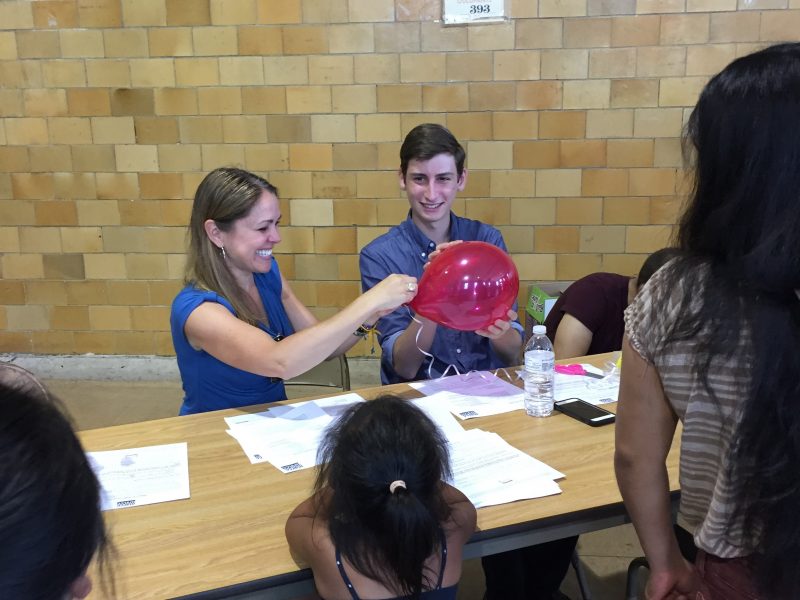Jewish Community Relations Council (JCRC)

Interfaith Engagement: Bridging Language Barriers to Help Immigrants Obtain a Valid ID
By Ethan Kahn
¿Buenos días? or ¿Buenas tardes? I wondered nervously as I fumbled to lift my phone to check the time. Was it the time of day to use the Spanish greeting for good morning or good afternoon? I was seated at a metal folding table—its milk-colored paint chipped and scratched—and faced a milling crowd of Latino immigrants. Other tables like mine lined the hot, sticky gym of the Su Casa Hispanic Center, an organization serving Latino immigrants in the Cincinnati area. I was there as a volunteer for the Metropolitan Area Religious Coalition of Cincinnati (MARCC) on behalf of the Jewish Community Relations Council (JCRC).
My goal: to assist immigrants who wanted to register for the MARCC ID, an easy-to-obtain photo ID card that is accepted almost everywhere in the Cincinnati area, including by the police, utility companies, and the public library. The reason for my agitated deliberation about the appropriate Spanish greeting: many of these immigrants spoke little or no English and required communication in their native language.
Almost exactly a month before, I had returned from a nine-month service program involving work and cultural immersion in Bolivia, a South American country known for its snow-capped mountains and verdant jungle. I supposedly had the Spanish competency required to help the immigrants gathered that day to acquire a small piece of plastic critical to their well-being and integration into the community. However, as I surveyed the other volunteers (there on behalf of organizations such as Head Start, the Red Cross, and TriHealth), I could tell that many of them were native Spanish speakers. And so I was anxious. How could I, a privileged kid from a well-assimilated Jewish family, be of any real assistance?
A woman with long black hair and a small child trailing her approached my table. “¡Hola!” I began slowly.
“¿Usted está interesada en la identificación de MARCC?” Hi! Are you interested in the MARCC ID?
“Sí.” She nodded in affirmation.
I asked her to come with me, and we passed through to another room with cameras, tables, and folding chairs. Other volunteers who were waiting and ready sprang into action to help her register for the ID and pay the $15 cost. I sat back down in the gym, feeling surprisingly elated over the roughly 30 words I had exchanged. The next few hours passed quickly; others, nearly always in the company of spouses and children, approached the table to inquire about the ID. I helped as best I could.
What has stayed with me are the images of a few people who came:
The short, round man in the sweater vest who entrusted me with his bag of food pantry groceries while he registered.
The woman who waited patiently for me to finish my jumbled spiel about the benefits of the ID with a kind smile on her face, before informing that she already had one.
The grandmother who walked several miles in old sandals to bring her nietos (grandchildren) to get health services.
Every one of them was kind, patient, and committed to the well-being of their families. Less important, although gratifying for me, was the fact that none of them judged me or my Spanish. My anxiety was unfounded. Even if my grammar wasn’t perfect and my accent immediately identified me as a gringo, they didn’t care. Because however well or poorly we connected through our words, the true cultural bridge was our values. At the JCRC, we strive to embody the Jewish values of mutual respect, understanding, and compassion for the vulnerable. But what’s wonderful is that these values are not exclusively Jewish. At the very least, they belong to anyone brave enough to come to a new country with almost nothing to make a better life for their family. The immigrants I met came with heavy grocery bags, with small children, and with smiles. Their grace and resilience in the face of adversity should be an example to us all.
The Metropolitan Area Religious Coalition of Cincinnati (MARCC), of which the Jewish Community Relations Council is a founding member, is just one of over fifty programs and agencies funded in part by the Jewish Federation of Cincinnati.
The Jewish Federation of Cincinnati: We look at the whole picture, taking into account the diverse needs of the entire community. Together we can do almost anything.
Thanks to you and MARCC, immigrant families in Greater Cincinnati are able to obtain valid IDs, accepted by many organizations in Cincinnati, including the police, utility companies, and the public library.

